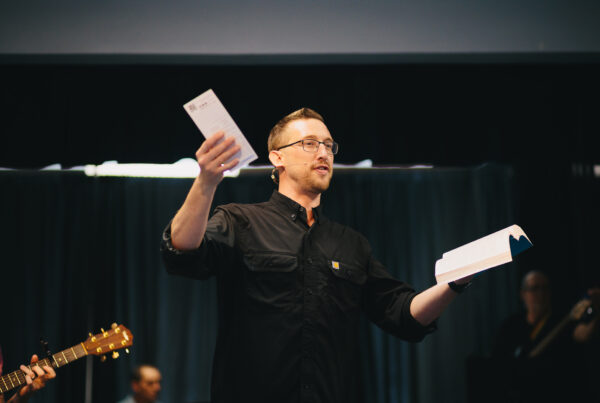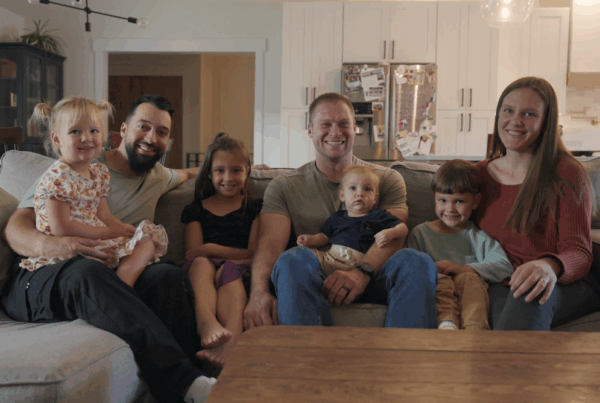I was 28 and did not have a clue what I was doing. Through a sequence of events my wife and I had sensed God’s invitation to step into church planting. I still remember as though it was yesterday. We had 2 little kids under 3, an old car, a cat, and some money in the bank from the sale of our house. Several friends said they would support us, leading to a few more hundred in the bank. “What have we got to lose?”, we thought. There’s a ton of truth in that statement! When we first plant a church there is not much to lose and not much to protect (I’m not including family in this statement). The church is very small, the income is next to non-existent, and all you really have to galvanize people is the Gospel, vision, community, and mission. Every day you risk it all for the great invitation to participate with God in His redemptive work. You dare to partner with God and believe that God is fulfilling what Habakuk 2:14 proclaims: that “the earth will be filled with the knowledge of the glory of the Lord as the waters cover the sea.” This reality is the thrust of the Great Commission and what drives us to dare to do something as bold and courageous as church planting. We see the insurmountable task in front of us, and we meet it head on by faith, risking everything for the call, knowing that the Church is the ultimate vehicle for Habakuk’s prophecy to unfold to the Glory of God. It’s easy to put God’s mission ahead of the church’s mission because there is not much of a church to protect yet.
When planting a church, it’s easy to put God’s mission ahead of the church’s mission because there is not much of a church to protect yet.
But then something crazy happens. It actually works. We plant a church, Jesus is worshipped, the gospel is preached, the lost are saved, the saved are discipled. People come. Some of them actually give of their time and talent and even their money. The church begins to grow and it’s something to see. We’re excited! God is doing something unique in our midst and it blows us away! And we keep going. And keep going. And keep going. And as we do, this church that was once a dream is now a reality. And it takes a LOT of work to operate this new found dream turned reality. People and programs begin and shift and change and expand. We have staff to be hired. There are leaders to train. There are things to do. There are perceptions to manage. There are expectations to fulfill. And the temptation lurks behind every corner to lose sight of the reason we started all of this stuff in the first place: so that “the earth will be filled with the knowledge of the glory of the Lord as the waters cover the sea.”
Simply put, our natural inclination is to shift our focus from serving to surviving!
Simply put, our natural inclination is to shift our focus from serving to surviving! Instead of dreaming about how the Kingdom of God can invade the darkness, we try to scratch and claw to keep the little corner of light we seem to possess. This mentality creeps in as we have more and more to lose. In the early days we would risk everything (because it was not much) to dare to live on mission serving God and the city. Now every move risks a great deal that took a great deal of work to acquire. This mentality seems innocent, after all. We are simply trying to “steward” the bride for Christ. However, this is our first step from being focused outwardly as a church planter, to being focused inwardly as a church protector. That has never been our calling! There is never a point at which it begins to make an ounce of sense to settle into our mission and thereby ignore His mission. We unintentionally prioritize our local church’s survival over serving God’s Kingdom, but we have no business doing this. It’s easy to do when the churches survival impacts multiple staff families, hundreds or even thousands of congregants, millions of dollars, and of course our own livelihood.
There is never a point at which it begins to make an ounce of sense to settle into our mission and thereby ignore His mission.
When we planted Mosaic Church in 2003, we asked a basic question of ourselves. “What is the purpose of the church?” What we concluded was born out of two basic biblical discoveries.
- God’s great command to love Him and love our neighbor
- The fact that we are both recipients of redemption (by God’s grace) and participants in redemption (by God’s grace)
These discoveries may seem elementary, but they began to shape everything we did. The clarity was that the purpose of the church is to make the Gospel (God’s redemptive story) beautiful and bring glory to God by loving God, loving people, and serving the world. Those simple things became our aim and our mission. At any cost, we would demonstrate our passion for God and His passion for people.
The church is sent to serve the Kingdom of God and be a force of redemption in this dark world, by invading dark, hard, unredeemed places.
Sounds simple enough, but this begged another question. If we are invited to participate in God’s redemptive story, what does that look like. This question led us to Jesus. After all, He is the one who lived out the redemptive process on this planet on our behalf. What was His way? Jesus declares in Mark 10:45, “For even the Son of Man did not come to be served, but to serve, and to give his life as a ransom for many.” His strategy to redeem humanity and overcome darkness and death was to serve and give his life away. Jesus served at the cost of survival. It is into this way that we are called as the church. The church is sent to serve the Kingdom of God and be a force of redemption in this dark world, by invading dark, hard, unredeemed places. The clear biblical mandate is to serve! We serve God’s Kingdom by serving the world at any cost, even the potential cost of our own survival.
This clarity became one of our mantras at Mosaic. When making decisions we would often ask, “Are we trying to serve at the risk of surviving, or survive at the cost of serving?” Sometimes we would ask, “How can we step into serving at the risk of surviving?” just to remind our souls of our identity in Christ. It’s not that we are suicidal, looking for ways to abandon survival. It’s that we know our tendency is to gravitate to self-preservation. If our active choices allow us to survive at the cost of serving, then what’s the point of surviving? Serve at the risk of survival. That’s what Jesus did. That’s what we have to do. It’s the only way. It’s our new identity! We have been invited by the King of kings and the Lord of lords to not only be a recipient of the Gospel, but a participant in the Gospel.
Are we trying to serve at the risk of surviving, or survive at the cost of serving?
The question remains, how do we sustain a clarity of vision and active commitment to church planting? It starts with a very simple mission, communicated clearly, regularly, and consistently and lived out in big and small ways. It means not just having a mission statement like, “Demonstrating our passion for God and His passion for people”, but living that mission statement and constantly communicating it. Put it everywhere, say it all the time, have it inform your choices.
Our active choices in little things need to be about God’s kingdom and not our church. May we be global church planters rather than local church protectors by serving God’s Church rather than our church. Church planting is a costly endeavor that risks the survival of the local church we shepherd. That’s why it’s a hard choice. However, if hard choices are our habit in the daily decisions, choosing to church plant will be a natural and normal part of our story.
In a nut shell, keep the mission simple. Live it first, say it often. Keep your eyes fixed on serving God’s global Church. Remind your soul often that serving at the risk of surviving is the Jesus way, because he gave his life as a ransom for many. Remember, if we survive at the cost of serving, then what’s the point of surviving?











